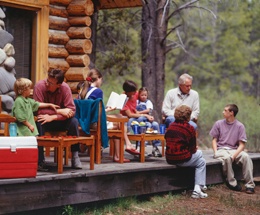 The grass is turning green, trees are beginning to bud, and the temperature is rising. It’s time to open your cottage or summer home!
The grass is turning green, trees are beginning to bud, and the temperature is rising. It’s time to open your cottage or summer home!
While opening your cottage can be very exciting, it can also be stressful and a lot of hard work.
Whether you’re opening your cottage for the first time or you’re a seasoned professional, here are some tips that can make this year’s opening more efficient and successful.
1. Create a checklist. With all the excitement surrounding the opening of your cottage, there may be a lot of information floating around in your brain. Writing things down, such as cleaning supplies needed or chores you want to complete can help you focus on things that are important. Lastly, don’t forget the keys!
2. Contact your utility companies. If you discontinued utility services during the winter months, don’t forget to have them reconnected before you leave home. Services could include electricity, propane, water, phone, internet, and TV.
3. Contact your insurance agent. If you’ve made changes since last year, contact your agent to make sure your insurance coverage is up-to-date. If you bought a new boat at the annual boat show, you’ll definitely want to make sure you have coverage. Check out the blog “Protect your watercraft and enjoy your summer!” to learn more.
In addition, if you have a fun summer car in storage near your cottage, make sure you’ve added insurance coverage back on before driving.
4. Conduct a physical inspection. Before unloading the items from your car, conduct a physical inspection inside and outside of the home. On the outside, look for:
- Fallen tree limbs, branches, and other debris;
- Curved or loose roof shingles or other defects;
- Cracked windows or damaged screens;
- Loose floor boards or railings on your deck or patio;
- Evidence of rodent infiltration;
- Different or unpleasant smells; and
- Low hanging utility lines.
Several of these items will apply to the inside as well. In addition, check inside for:
- Wet or stained carpet, ceiling, or furniture;
- Damaged wiring; and
- Damaged appliances.
Once you turn the water back on, inspect water lines and check around your sinks and toilets to make sure there are no visible water leaks.
If you find damage, contact a local contractor, plumber, or electrician. Also, don’t forget your insurance agent.
5. Clean your septic system. If you didn’t have your septic system pumped when you closed your cottage, make sure to take care of it now.
6. Inspect your fireplace. If you have a wood burning fireplace that you used during the fall or haven’t cleaned for a number of years, consider having it inspected and cleaned by a reputable chimney sweep. Creosote is a residue that travels up your chimney and builds up on your flue over time. In fact, some creosote builds up every time a wood burning fireplace is lit. If that residue isn’t properly cleaned out, the chance of a fire igniting in your chimney increases.
7. Prioritize your projects. Once you have inspected your property, create a prioritized list of projects you need to complete. Again, this will help free up your brainpower for other things.
8. Dispose of oily rags properly. This is very important! If staining your deck is one of this year’s projects, dispose of oily rags properly. Oily rags stacked in a pile can lead to spontaneous combustion. Unfortunately, many families have lost their homes to fire. To keep you and your family safe please read the blog “House Fire Prevention: How To Store And Dispose of Oily Rags.”
9. Consider installing surge protectors. Let’s face it; even though we want to get away, electronics are a big part of our lives. Consider installing surge protectors on your outlets to keep your electronics safe from a power surge or lightning strike.
10. Consider installing a weather radio. During the summer months, weather can change significantly in a short period. A weather radio broadcasts both normal and emergency weather information. If severe weather is near your area, an audio alert is broadcast to inform you of the impending danger. This warning system is particularly useful at night when you and your family are sleeping. I’ll admit, the alert is startling at night, but it’s well worth it as I don’t usually hear the tornado sirens. Some radios also come with colored LED or strobe lights.
11. Take your neighbors a gift. If you have neighbors who have kept an eye on your property all winter, it is a nice idea to give them a gift to show your appreciation. They can be very impactful in stopping a theft or disaster during the off-season.
12. Create a home inventory. After you’ve completed your tasks and your cottage is open for the season, consider creating a home inventory. It’s likely each year the personal property at your cottage will change. If it was destroyed by fire or severe weather, would you remember every possession you had in it?
Do you have any tips you’d like to share? I’d love to hear your thoughts; please share them in the box below.





